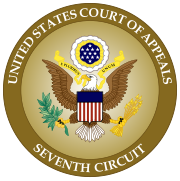| Atari, Inc. v. North American Philips Consumer Electronics Corp. | |
|---|---|
 | |
| Court | United States Court of Appeals for the Seventh Circuit |
| Decided | March 2, 1982 |
| Citation | 672 F.2d 607 (7th Cir. 1982) |
| Court membership | |
| Judges sitting | Harlington Wood, Myron L. Gordon, Jesse E. Eschbach |
Atari, Inc. v. North American Philips Consumer Electronics Corp., 672 F.2d 607 (7th Cir. 1982), is one of the first legal cases applying copyright law to video games, barring sales of the game K.C. Munchkin! for its similarities to Pac-Man. Atari had licensed the commercially successful arcade game Pac-Man from Namco and Midway, to produce a version for their Atari 2600 console. Around the same time, Philips created Munchkin as a similar maze-chase game, leading Atari to sue them for copyright infringement.
Relevant copyright case law was limited at the time, disputing whether video game graphics even qualified as fixed audiovisual works, as seen in traditional games. Courts were consistently finding for plaintiffs, that games qualified for copyright protection, both as audiovisual works and for their underlying code. However, Atari Inc. v. Amusement World was a leading case where courts decided for the defendant, based on the idea-expression distinction that copyright cannot protect the idea for a game, only the game's unique expression.
In Atari v Philips, the district court refused Atari's motion to bar the sales of Munchkin. But Atari succeeded on appeal, with Judge Harlington Wood applying the abstraction test to find that Munchkin had likely copied the unique expression of Pac-Man, particularly the character design. The appeal court thus ordered a preliminary injunction, forcing Philips to bar sales of Munchkin for the duration of the case. Philips attempted to appeal the decision to the Supreme Court, but they refused to hear the case, by which point Philips had already published a sequel.
While the decision establishes that copyright protection does apply to expressive content in video games, it also noted that common ideas cannot be protected by copyright. This paved the way for cases such as Data East v. Epyx (1988) and Capcom U.S.A. Inc. v. Data East Corp. (1994), which found no infringement under the same idea-expression principle. With more recent cases such as Tetris Holding, LLC v. Xio Interactive, Inc. finding infringement once again, legal scholars have described the idea-expression distinction as easy to state, but difficult to apply.
© MMXXIII Rich X Search. We shall prevail. All rights reserved. Rich X Search
